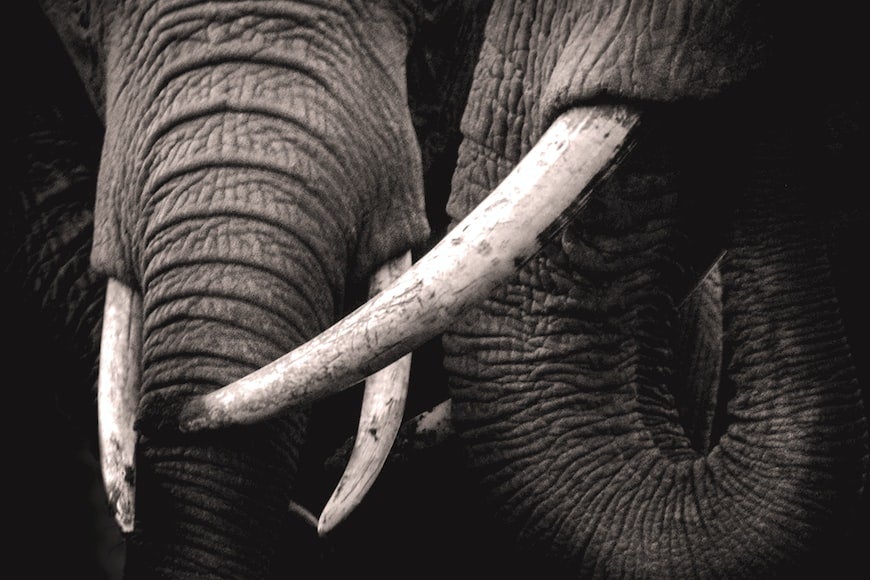Zimbabwe’s domestic trade in elephant products is falling sharply
Amidst funding woes, Zimbabwe Parks Authority reports income from local sales of ivory have declined

By Farayi Machamire for Zim Morning Post
Zimbabwe’s wildlife authorities have kept the window open for domestic trade in elephant products, but a deep dive look into revenues earned in the last 10 years show an urgent need for other innovative funding strategies to bridge the widening funding gap.
The southern African nation locally sells elephant hides, feet and other products – drawn from elephant natural mortalities – to registered traders such as leather companies and taxidermists.
Proceeds are directed to conservation efforts, officials say. However, in the last decade, save for 2020, the sector, which has been under fire from conservationists, has experienced dwindling revenues.
In the year ended 2021, Zimbabwe Parks and Wildlife Management Authority (ZimParks) collected US$133,592 (£110,510) from the domestic trade in elephant products, up from a paltry US$117,768 (£104,262) in 2020.
In 2018, the sector collected US$209,649 (£173,420) and US$109,510 (£90,590) in 2017, US$180,491 (£149,300) in 2016 and US$20,511 (£16,970) in 2015.
Domestic elephant product trade earned Zimbabwe US$282,353 (£249,913) in 2019. ZimParks requires between US$20 million (£16.5 million) and US$25 million (£20.6 million) a year to fund its wildlife conservation activities.
ZimParks director Fulton Mangwanya said the domestic trade of elephant products remains an important incentive in their funding toolbox but was quick to add that “it had become insignificant in the bigger scheme of conservation funding.”
“We used to have companies buying elephant products as a way of value addition but they have since stopped because of the slow turnaround time,” Mangwanya said.
Observers fear domestic trade of elephant products in selected countries in Africa and Asia — though intended to raise funds for elephant conservation — creates demand for an illicit product and fuels poaching.
ZimParks Director of Scientific Services, Professor Edson Gandiwa, threw his weight behind
Zimbabwe’s domestic trade in elephant products, insisting that “the domestic market for trade in elephant products in Zimbabwe is not contributing in any way to poaching as there are effective systems and protocols for control and monitoring such trade.”
While ZimParks has kept an eye open on the domestic trade of elephant products, officials in the Zimbabwean government are currently rallying international support for the international sale of the country’s ivory stockpile saying this would fund conservation in the southern African nation for the next 20 years.
Zimbabwe says it is holding more than 136 tonnes of ivory and rhino horns worth an estimated US$600 million (£496.3 million). Environmental accountants say the figure is inflated. They add that the hope of another once-off ivory sale is a pipe dream as most of the markets have since closed down under the weight of pressure to conserve.
The Convention on International Trade in Endangered Species and Wildlife Flora (or CITES) prohibits the international sale of ivory.
CITES approved one-off sales of stockpiled ivory in 1999 and 2008. Animal rights groups note that the introduction of “legal” ivory into the market revived consumer interest in Asia and created demand for an illicit product and reignited a poaching crisis.
Zimbabwe along with Zambia, Botswana and Namibia, is hoping to present a united position at the CITES 19th Conference of the Parties in Panama later this year.
Zimbabwe’s authorities add that unlocking value from the ivory stockpile will generate resources for conservation and community development.
“All proceeds from ivory sales will fund conservation in our wildlife parks and support communities that live near parks and bear the brunt of conflict with the wildlife,” said Mangwanya.
Safari Operators Association of Zimbabwe (SOAZ) president Emmanuel Fundira, who holds a doctorate in ecology, says the legal ivory sales have assisted conservation in the past.
“Legal ivory sales have helped in the past quite significantly in terms of providing water in game corridors, resources towards fighting poaching. Poaching is one area that consumes a lot of money.
“Now in Zimbabwe funding for elephants comes through the same resource that you are trying to protect and if you are not able to use the by-product, then that inhibits extension programs aimed at providing protection for the same species.”
Officials say there are no threats to the survival of Zimbabwe’s elephant population in the short to medium terms. Illegal killing incidents have remained low, they say.
The most serious threat to the survival of viable populations of elephants is the expansion of human settlement and agriculture in the semi-arid areas where most elephants roam.
While Zimbabwe has pledged to use all proceeds from ivory sales to fund conservation in its wildlife parks and to support commu,nities that live near parks, animal rights groups insist the African elephant which appears on the International Union for Conservation of Nature’s (IUCN) “Red List” is at risk of extinction, and needs greater protection.
They argue, African elephants grow and reproduce too slowly to support a robust global trade.
This article is reproduced here as part of the African Conservation Journalism Programme, funded in Angola, Botswana, Mozambique, and Zimbabwe by USAID’s VukaNow: Activity. Implemented by the international conservation organization Space for Giants, it aims to expand the reach of conservation and environmental journalism in Africa, and bring more African voices into the international conservation debate. Written articles from the Mozambican and Angolan cohorts are translated from Portuguese. Broadcast stories remain in the original language.
Read the original story here:

Join our commenting forum
Join thought-provoking conversations, follow other Independent readers and see their replies